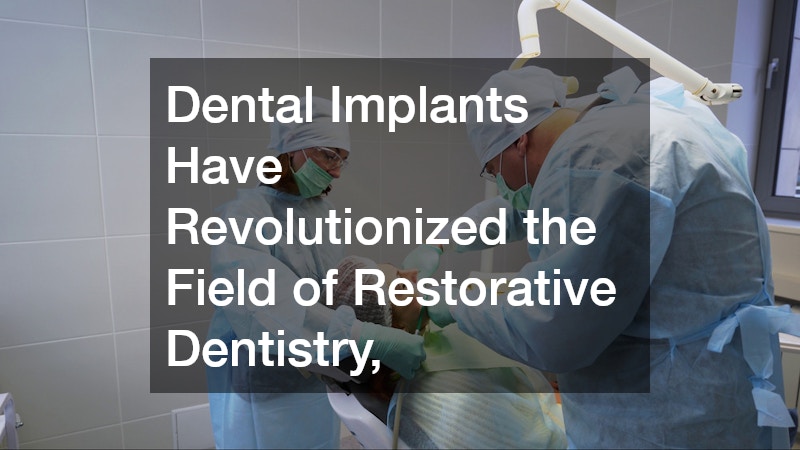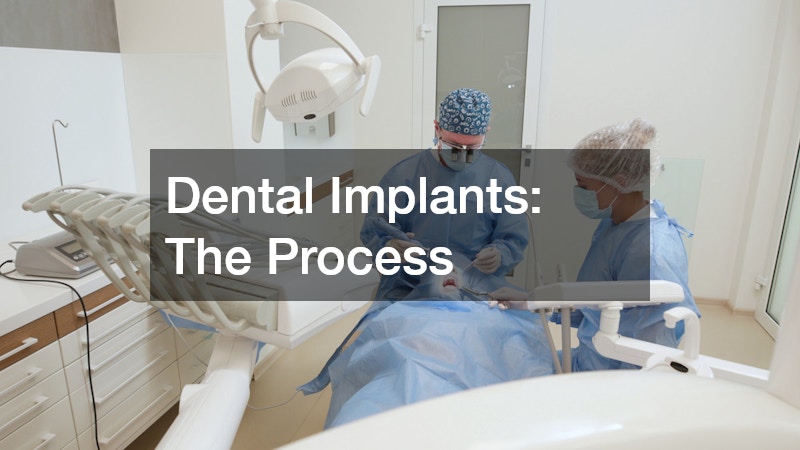Dental implants have revolutionized the field of restorative dentistry, offering a durable and aesthetic solution for individuals who have lost teeth. Unlike traditional dentures or bridges, dental implants are designed to fuse with the bone, providing a secure and long-lasting alternative. Whether due to decay, injury, or periodontal disease, tooth loss is a prevalent issue that can lead to further oral health complications if not addressed.
Understanding the dental implant process is crucial for anyone considering this advanced option for tooth replacement.
Compared to other tooth replacement alternatives, dental implants stand out for their strength and natural appearance. They can restore the patient’s ability to chew and speak properly, contributing significantly to improved quality of life. Additionally, implants help maintain the jawbone’s integrity, preventing the bone deterioration that often occurs with missing teeth. The process of getting dental implants involves several stages, and it is advantageous to be aware of what to expect at each step to make informed decisions about dental health.
As we delve into the specifics of dental implantation, this article will cover what dental implants are, the detailed process involved in getting them, and what patients can expect after the procedure. Each aspect is essential in grasping the comprehensive nature of this dental innovation. Armed with information, potential candidates can approach their treatment with confidence and clarity.
What are Dental Implants?
Dental implants are sophisticated devices designed to emulate the root of a natural tooth and provide a foundation for permanent or removable replacement teeth that are made to match natural teeth. They are primarily constructed of titanium, a biocompatible material that integrates seamlessly with the jawbone. The implant system consists of three main components: the implant post, an abutment that connects the post to the new tooth, and the prosthetic tooth or crown itself. This combination ensures not only structural support but also aesthetic restoration, culminating in an outcome indistinguishable from natural teeth.
Determining candidacy for dental implants involves a thorough dental examination and assessment of oral health. Generally, candidates must have healthy gums and sufficient bone density to support the implant. Certain health conditions, such as uncontrolled diabetes or heart disease, might influence eligibility. Moreover, lifestyle factors, including smoking, can impact the success rate of implants. A comprehensive evaluation by a dental professional is crucial to ascertain a patient’s suitability for this procedure.
The advantages of dental implants over traditional dentures or bridges are numerous. One key benefit is the preservation of jawbone health, which traditional methods do not offer. Implants stimulate the bone, preventing the resorption that typically accompanies tooth loss. Additionally, implants offer superior comfort and functionality, eliminating the discomfort and inconvenience associated with removable dentures. They are fixed in place, allowing for better speech and more confidence in social interactions. Furthermore, dental implants do not compromise the health of adjacent teeth, unlike bridges, which require the alteration of neighboring teeth for support.
What Does the Dental Implant Process Involve?
The dental implant process begins with an initial consultation and assessment. During this phase, a dentist or oral surgeon evaluates the patient’s oral health needs and discusses treatment options. This involves a detailed review of dental and health history, alongside diagnostic imaging like X-rays and 3D scans. These tools help determine the condition of the jawbone and decide the optimal placement of the implants. The initial consultation is a critical step that sets the stage for a successful procedure, providing both patient and clinician a clear understanding of the path forward.
Following the consultation, the next step is the surgical procedure to place the implant into the jawbone. This is typically performed under local anesthesia, but sedation options are available for those who require them. The surgeon makes a small incision in the gum to access the bone, drills a hole carefully, and places the titanium implant. Once placed, the gum is stitched up, and the healing process begins. This surgical precision ensures the implant is inserted correctly, optimizing the chances for osseointegration, where the implant fuses with the bone.
The healing process is crucial, as it allows osseointegration to occur—this is the period during which the implant fuses with the jawbone, forming a strong foundation for the new tooth. This can take several months and requires careful monitoring by the dentist. During this time, temporary crowns or bridges may be provided so the patient can maintain normal function and aesthetics. The healing phase demands patience but is pivotal in the long-term success of the implant. Post-surgery care instructions are provided to support recovery and ensure the site remains free from infection.
What Can I Expect After Getting Dental Implants?
Recovery time after dental implant surgery varies among individuals but generally spans several weeks. Patients will need to follow specific post-operative care guidelines, which include maintaining good oral hygiene, following a soft-food diet initially, and attending follow-up appointments. It’s essential to avoid putting undue pressure on the new implant area during the healing phase. Over-the-counter pain medications are often sufficient to manage any discomfort. Adhering to the post-surgery care plan can significantly influence the success of the implant assimilation process.
While dental implants boast a high success rate, potential risks and complications are associated with any surgical procedure. Factors such as infections, injury to surrounding teeth, and nerve damage, albeit rare, can occur. In some cases, the implant may fail to integrate with the jawbone, necessitating its removal. Despite these risks, advancements in dental technology and techniques have made complications increasingly uncommon. Patients must communicate openly with their dental providers and report any unusual symptoms promptly to address issues before they escalate.
Once the implant site has healed and the permanent crown is in place, long-term care and maintenance become the focus to ensure the longevity of the implants. Regular dental check-ups are critical for monitoring the implant’s condition and the surrounding gum tissue. Daily oral hygiene practices, including brushing, flossing, and occasionally using an oral irrigator, help keep the implant area free from plaque and bacterial build-up. With proper care, dental implants can last many decades, offering a sustainable solution for those needing tooth replacement.
Dental implants represent an advanced and effective solution for individuals facing the challenges of missing teeth. Their capacity to blend seamlessly with natural teeth, preserve jawbone health, and provide unmatched durability and comfort sets them apart from traditional dental restoration methods. As elucidated in the article, understanding the intricacies of the implant process and having realistic expectations post-procedure are integral to making an informed decision.
The long-term benefits of choosing dental implants extend beyond aesthetic enhancement, impacting vital functions such as speech and mastication, while also contributing to overall oral health. As dental technology continues to evolve, the accessibility and success rates of implants are expected to rise, offering an appealing option to a broader demographic. The decision to pursue dental implants is significant and should be made in conjunction with professional dental advice tailored to individual needs and circumstances.
Ultimately, embracing dental implants as a viable tooth replacement option is an investment in oral health and well-being. For those who qualify, they offer the promise of restored function, confidence in one’s smile, and a solution that, with proper care, is built to last. Dental implants are not merely a cosmetic enhancement; they are a comprehensive approach to achieving lasting dental health.

